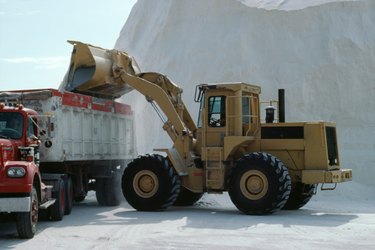
If you've lived in a part of the country where it snows in winter, you know how helpful road salt can be in keeping roads free from ice. Despite its benefits, however, road salt isn't good for your plants, and an excess can kill your grass. The reasons why it harms your grass has to do with the way roots take up water and nutrients from soil.
Osmosis
Video of the Day
When road salt dissolved in melting ice and snow seeps into your soil, it increases the salt content of the soil, and no immediate mechanism exists to carry it away. When water can cross a membrane but the dissolved salts are not free to do the same, the water will flow across the membrane in the direction of increasing salt concentration, a process called osmosis. Grasses take up the water they need from the soil using osmosis.
Video of the Day
Roots
As the salt concentration of the soil increases, the grass will find it more difficult to extract the water they need from the soil. The sodium ions may be taken up by soil particles, but the chloride ions remain more mobile, and these are often absorbed through the roots of the grass, where they start to accumulate in plant tissue. Once again, osmosis causes these tissues to take up or retain water at the expense of other parts of the plant, resulting in dehydration.
Minerals
The dehydration in grass exposed to excess road salt is similar to many of the symptoms of drought. The road salt also affects the grass in other ways, however. High concentrations of sodium ions can displace nutrients like phosphorus or potassium, depriving the grass of nutrients important for its growth. Brown scorching and yellowing between veins are common symptoms of potassium deficiency. Symptoms of phosphorus deficiency are less distinct and less easy to recognize, although it has a severe stunting effect on growth.
Considerations
While turf grass, like nearly any plant, is definitely vulnerable to the effects of high salt concentration, it's important to note that it is actually less vulnerable than many species of trees and shrubs, which are more easily affected. One option to minimize the damage is to choose another more grass-friendly type of road salt like calcium magnesium acetate, which contains neither sodium nor chloride ions and thus has less effect.